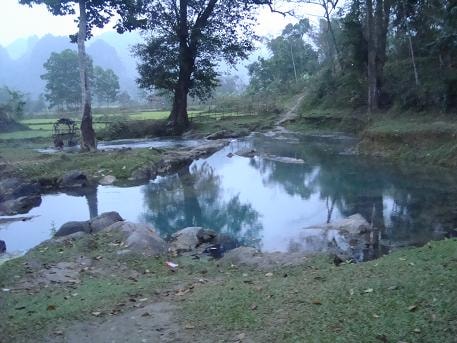Environmental protection messages in Thai proverbs
(Baonghean) - Thai proverbs summarize life experiences in a concise, specific, easy-to-understand, and convincing way. The above proverbs are messages about environmental protection that our ancestors "sent" to us.
1. The Thai people have a proverb: “Khâu độ na/ Pá độ nhâm/ Pơ nha xam hóng liệng téi con”, which means: “Rice is in the fields/ Fish is in the water/ No one should destroy the source of human life”. The first part affirms that the living environment of rice is in the fields; of fish is in the water. People live thanks to rice and fish to eat. People who want to have rice and fish must protect the fields, protect the water, protect the land, that is, the living environment in general. The first part is the premise for the second part: “No one should destroy the source of human life”, which means do not destroy the living environment. The proverb advises people to behave well with the environment to protect their own source of life and that of their descendants.
 |
| Illustration photo |
2. Forests are the “root” of the environment. With forests, there are water sources and water mines. With forests, we can develop forever. Loving and protecting forests is the ethical standard of humans. “Hiem pa vay lun lang chang ma/ Vay hau nam chu bo lay longng/ Phau chu day khot nam man chang pen con”, which means: “Love the forest so that future generations will be prosperous/ So that all water mines will flow forever/ Whoever can preserve the water source (will) be a good person”.
3. Must keep the forest “old”. Must know how to “avoid” the forest, “fear” the forest. “Pa dong xong cot/ May pen hon/ Con pen nuot/ Pa cam dong reoi/ May hoa ta/ Pa hoa bo/ Pa tam din pieng/ Pa reoi dong cam/ Pa cam dong xen”, meaning: “Old, wild forest/ Trees should be hairy/ People should be bearded/ Forest should be avoided, forest should be a cemetery/ Trees at the wharf/ Forest at the source/ Lowland forest/ Cemetery forest, forbidden forest/ Forest should be “startled”.
4. Or like the sentence: “Bo mi nam, bo mi na/ Nam tuong na ho hau mua khau/ Men hóng lieng pan pi toi con”, meaning: “Without water, without fields/ water and fields give us crops/ They are what sustains human life, for thousands of years”. The first part affirms: Without water, there are no fields, because to farm, there must be water. Fields are the consequence/result of water (of course, combined with land and human labor and creativity). Following that way of reasoning, the second part says: Water and fields provide people with rice to eat. Without water, there are no fields. Without fields, of course, there is no rice to eat. The third part continues the idea of the second part, stating the importance of crops, of rice, “which sustains human life for thousands of years”. The proverb is structured in the style of “without A there is no B”, to infer “without B there is also no C”: Without water there is no field. Without field there is no rice (crops). Without crops there is nothing to feed people.
– make listeners/readers learn lessons on how to behave well with water resources, land, labor, etc. That is, how to behave, protect the environment, and behave properly with themselves.
Thai proverbs summarize life experiences in a concise, specific, easy-to-understand, and convincing way. The above proverbs are messages about environmental protection that our ancestors "sent" to us.
Vi Mien Restaurant






